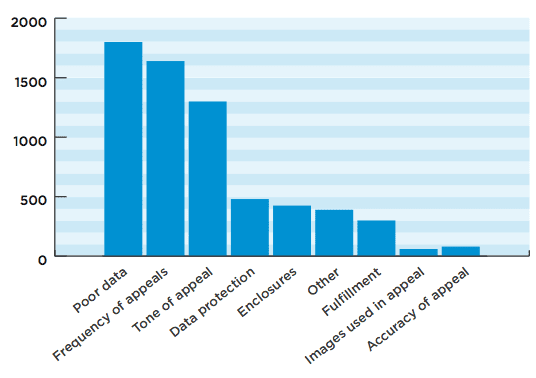So what do people really dislike about direct mail appeals?
The FRSB has just released their Annual Report for 2010. Based on the detailed analysis of complaints received by 1,138 UK charities, I'd say it paints a pretty decent picture of our noble profession.
Even when you look at the more 'engaging' fundraising techniques – such as face to face recruitment (in the street and at the door), telephone and direct mail – we find it takes a huge number of solicitations to generate a single complaint.
In the case of direct mail, for example, we can expect one complaint for every 2,439 packs that drop through the country's letterboxes. Expressed as a percentage that's just 0.006%.
To my mind, that's not too shabby.
But where it gets particularly interesting is when we start looking at what aspects of DM people are actually complaining about.
The answer might surprise you...

If you have followed the debate in the sector press over the last few years, you could be forgiven for thinking that the biggest threat to fundraising was the pen. By that, I mean the pen that many charities enclose with an appeal, primarily to make it easy for the donor to respond.
If it's not the pen, it might be the greeting cards, the address labels, the badges, the wrist bands, cuddly toys or the various other enclosures that are used to engage donors and lift response rates.
This report shows that where the reason for complaint was recorded (as it was in 6,556 cases – about two-thirds of all notifications), enclosures were mentioned approximately four hundred and twenty times.
That's four hundred and twenty complaints for over 147 million mailing packs. A complaint rate of 0.0003%.
Of course, not all charities use enclosures and not all charities are members of the FRSB. And there may be hundreds of complaints about enclosures to organisations that aren't reporting them, but this study would tend to demonstrate that it's not really an issue.
But what the report does highlight, is that the data policies of many organisations could do with a bit of a clean-up.
Around 60% of all DM complaints were related in some way to data issues. It could be poorly addressed communications or mailings sent to deceased individuals. It could be a failure to ensure non-responsive recipients are removed from mailing files (frequency concerns) or simply not taking enough care of the data entrusted to us.
And that's the biggest surprise for me. A robust data process is a fundraising no-brainer. Not only will it help tackle complaints, but it also reduces costs – achieved by regularly cleaning data and excluding those donors who (through their inaction) have told us that they no longer want to support you.
Add the increased income a sensible data strategy can add to your bottom-line and you find little reason not to invest in ensuring you get your data right.
Tags In
Related Posts
1 Comment
Comments are closed.
The Essentials

Crack the Code to Regular Giving: Insights, Strategies, and a Special Giveaway!

‘Tis Halloween. Keep to the light and beware the Four Fundraisers of the Apocalypse!

Why do people give? The Donor Participation Project with Louis Diez.

A guide to fundraising on the back of a postcard

What does the latest research tell us about the state of fundraising?






Thanks for sharing this Mark. While premiums/freemiums get a bit of attention in Australia, I have found more people perceive ‘too much mail’ as a bigger problem. I say perceive because if I inferred from what people said the rate of people who complained, it would be significantly larger than 0.006%.
I enjoyed reading the report from the FRSB and your blog post. Many thanks.
The Data Monkey
(http://thedatamonkey.wordpress.com/2011/06/06/the-annoyance-of-direct-mail-blink-and-youll-miss-it/)